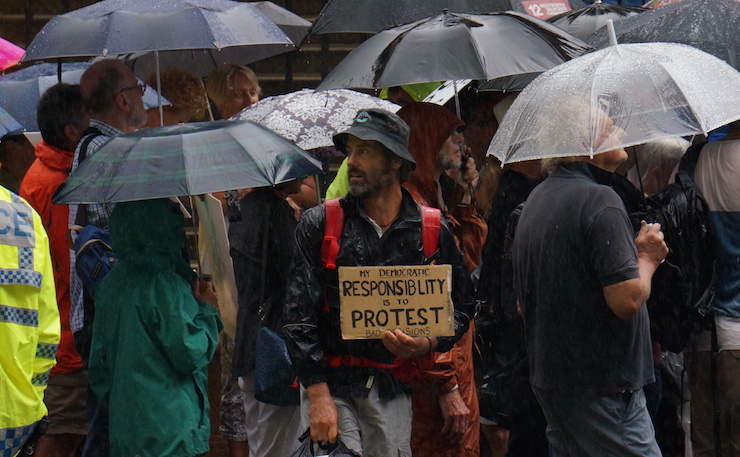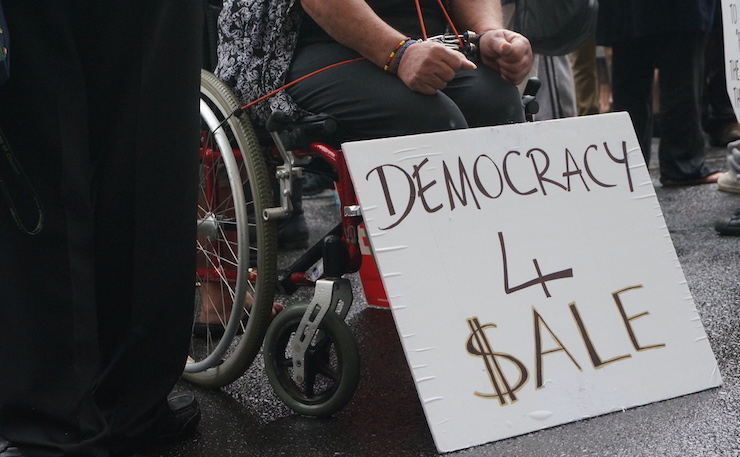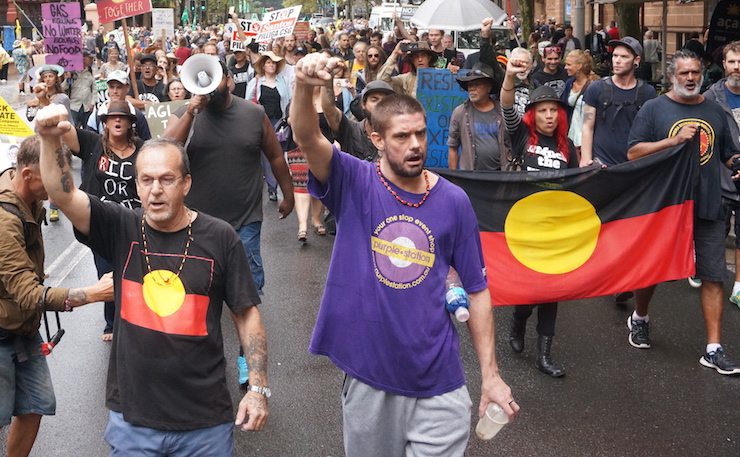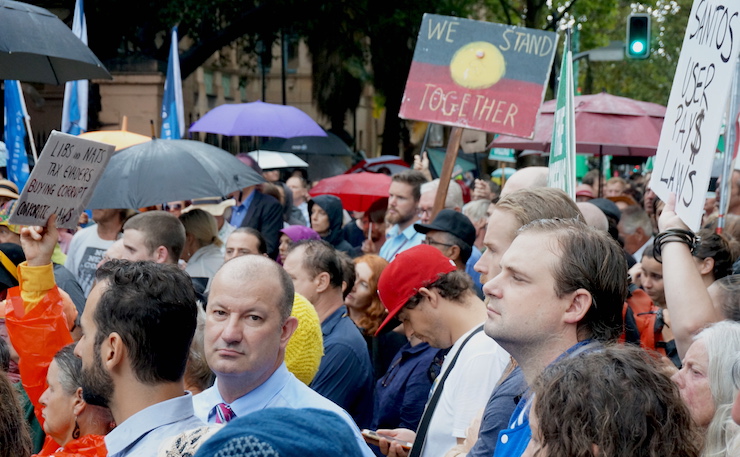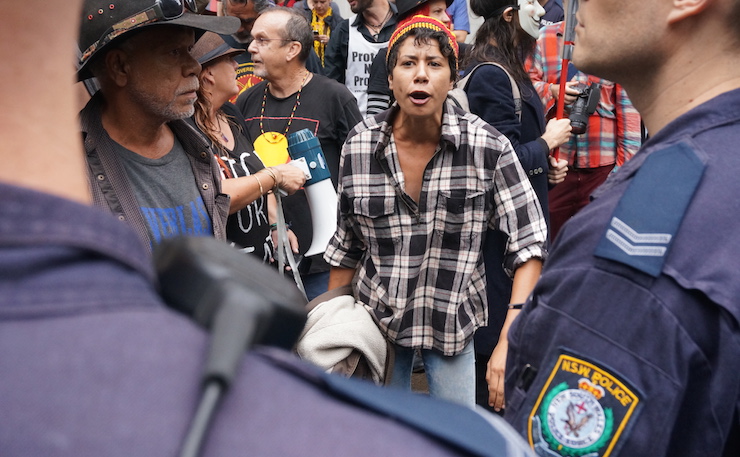A protest against Mike Baird’s anti-protest laws which attracted hundreds of people today turned rowdy, with demonstrators blocking traffic in a move which ironically enough would have put them in breach of reforms currently being progressed by the New South Wales government.
The demonstration drew Parliamentarians from the Greens and Labor, the Secretary of Unions New South Wales, and speakers and activists from the Council for Civil Liberties and a host of environment and Aboriginal rights movements. As it came to a close, an emotional wheelchair-bound woman took the stage and exhorted protestors to block traffic.
“We now need to stand up together. I’m in a fucking wheelchair, but I’m standing in front of you today because we all need to show them what we mean – block the road, get out there and block the road,” she said.
“If you’re here to protest anti-protest laws then get on the road and protest,” another man said as the woman – having got back in her wheelchair – moved to obstruct traffic. She blocked the one lane that had been flowing past the front entrance to the state Parliament, and bound her wrists together in a symbolic condemnation of specific provisions in the Baird Government reforms.
After some confusion, a smaller group than had been at the main rally decided to join in.
Demonstrators then moved north towards Circular Quay, before being stopped by riot police, and then south, where they were also met with a line of blue uniforms.
The emotional episode eventually fizzled out, but it went a long way to indicating the depth of feeling the Baird Government has provoked with its anti-protest reforms, which are expected to proceed to the Upper House tonight. The Inclosed Lands, Crimes and Law Enforcement Legislation Amendment (Interference) Bill 2016 may even pass through Parliament later today, just over a week after they were first introduced by the Minister for Industry, Resources and Energy, Anthony Roberts.
Addressing the protest today, Labor politician Adam Searle said the laws are “completely unnecessary,” that the government is trying to “shut down dissent,” and is a threat that “requires every single one of us to stand up and say: ‘No, not in New South Wales, not today, not ever’”. Greens Justice spokesperson David Shoebridge urged people to “stand up to the weather, stand up to Baird, and stand up for the right to protest”.
And they did. Despite at times torrential rain in Sydney, hundreds of protestors turned out to condemn the Baird Government. Some activists and farmers travelled from as far as Narrabri, in north-west New South Wales, and Lismore, on the state’s far north coast. Both are regions where coal seam gas has been a flashpoint, and many of the people at the demonstration suggested the Baird government has been bought by fossil fuel interests. “Democracy for sale,” one placard read. “Santos’ user pays laws,” said another.
The sign that chimed most with the message at the protest, however, was one which suggested it was a “democratic responsibility to protest bad decisions”.
The New South Wales Premier announced his intention to introduce a tranche of anti-protest measures in November 2014 at a mining industry dinner, where he promised he would “crack down” on civil disobedience and “throw the book” at protestors who broke the law in order to disrupt and delay mining companies. As New Matilda has previously reported, however, the laws go much further than that.
They have been condemned as an unnecessary infringement on civil liberties and an unjustified expansion of police powers by the New South Wales Law Society, the Environmental Defenders Office, and the Council for Civil Liberties, as well as independent legal academics like Aidan Ricketts, a lecturer at Southern Cross University specialising in protest law.
In short, they will increase fines for trespassing on mining companies’ property, or property in which mining companies have an interest by a factor of ten, from $550 to $5,500; they expose people protesting against coal seam gas to a seven-year jail sentence; and they provide police with beefed up powers to confiscate things they suspect may be used in a protest, and to disband protests generally in a departure from previous rules governing when and why police could disperse crowds.
The union movement has also struck out at the laws, with Unions New South Wales Secretary Mark Morey threatening a High Court challenge. Earlier today, Morey told New Matilda that the reforms represent “an unprecedented attack on our political right to free speech”. “This is about shutting down dissent, trying to shut down anyone who disagrees with [the government], whether it’s on environmental grounds or industrial grounds,” he said.
He said the Bill’s affect on industrial matters is “ambiguous, and it now looks like police would have the ability to intervene in industrial matters”. The union boss also has concerns about the reform’s general implications for protests too. “You could potentially, in an enclosed land such as a school, have a situation where a whole group of students decided to stage a sit-in and that could be deemed an illegal action. That’s how crazy this stuff is,” he said.
Morey also flagged concerns that if one person misbehaved at a protest, whether they were associated with that protest or not, “police would be able to make a subjective decision to shut the whole protest down and move it on”.
“If we get advice that says there is a better than 50-50 chance to win it, we will run a High Court challenge,” he said.
Greens MP for Newtown, Jenny Leong said that while progressive movements are united in recognising their right to protest and non-violent direct action dissent, “when those big business and corporate folks all go to Canberra – or all come into this place – lobbying for what’s in their interest, the one thing that unites them is their desire to want to see an end to regulation over big corporations and big business”.
“As a member of the Greens and a Member of Parliament, I will continue to engage in peaceful protest no matter what this state government says are the laws, because we have a fundamental human right to protest and stand up for the things that we think matter, and to object to some of the conservative right-wing agendas that we are seeing being delivered by this government,” she said.
Anne Thompson, a prominent figure in the ‘Knitting Nannas Against Gas’ movement, also vowed to continue to protest regardless of the law. “We can’t afford $5,500 fines – we’d rather go to jail,” she said. “We’re already making jail-bird outfits,” she said.
Bentley farmer Peter Neilson, who’s been fighting against coal seam gas near his property, sees things the same way. “If we roll over and give up, we may as well just walk off our properties and walk away,” he said.
“Even if this new legislation goes through, we’re going to fight tooth and nail to the very end.”
Donate To New Matilda
New Matilda is a small, independent media outlet. We survive through reader contributions, and never losing a lawsuit. If you got something from this article, giving something back helps us to continue speaking truth to power. Every little bit counts.

